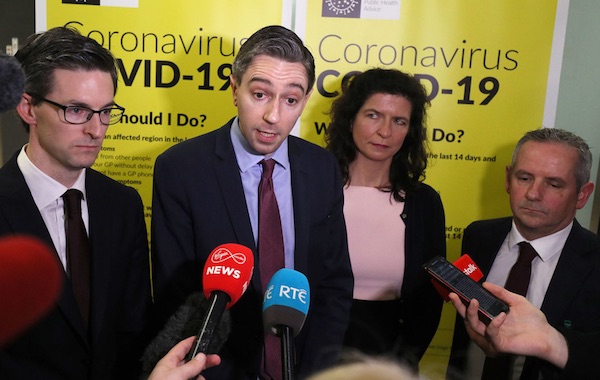
The shambolic attitude of the Dublin government to the Coronavirus epidemic has been exposed after the first case of the disease presented itself in Ireland.
A patient contracted the virus in the north of Italy and flew into the country unchecked via Dublin Airport. The woman, with a young child, then travelled north to Belfast, where she later requested medical assistance.
The woman is currently being treated at an isolation ward which has been set up at the Royal Victoria Hospital in Belfast. It was reported that public health bodies are attempting to “curb panic” by not revealing details of her movements.
The lethal flu-like respiratory disease has so far killed one in twelve of those infected, relative to the number who have recovered. It can be transmitted through the air or by contact with affected surfaces.
From leaks, it is understood the woman travelled from Dublin Airport by bus to Connolly Station in Dublin, where she took a train to Belfast. Among the details which state agencies have refused to release are the number, origin, and date of the flight; as well as the time and date of her bus and train journeys.
Although passengers who travelled in seats near the patient on the flight from Italy have been informed, there has been no attempt to inform people who may have been in contact with the patient on public transport here in Ireland.
Cabin crew on the affected Aer Lingus flight were also left in the dark about their situation until late Friday afternoon, when they were issued with an internal memo to “self-isolate”.
Despite its origin in an area where there are have been hundreds of cases of the deadly virus, there were no checks or restrictions on the incoming flight.
At a media briefing in Dublin on Friday, Ireland’s Chief Medical Officer, Dr Tony Holohan, said the government’s policy is to hope individuals with symptoms travelling back from an affected area will come forward voluntarily.
The Minister for Health, Simon Harris, said freedom of movement in the European Union should be respected, regardless of the risk posed by the disease.
“We can’t ban travel, that wouldn’t be a proportionate thing to do,” the outgoing Minister said. “We live in the European Union, there is free movement, and that’s a proportionate thing to do.”
The lack of solid information has been compounded by the ongoing delay in forming a new government, which is not now expected to be resolved before the end of March.
Only three sessions of parliament are scheduled over the next four weeks due to the St Patrick’s Day holiday, when senior Irish government figures jet around the world on international junkets.
Ireland’s men’s and women’s Six Nations rugby games against Italy in Dublin on 7 and 8 March have been postponed because of the virus, but so far there are no plans to cancel St Patrick’s Day parades or other festivities. The week-long festival is expected to being thousands of international visitors to Dublin.
Aontú leader Peadar Tóibín TD has called for the immediate recall of the Dáil in order to help deal with the crisis. He said there were “significant differences” between the Irish approach and those of other countries who monitor passengers from high-threat regions and impose strict isolation requirements.
“The Irish approach has yet to take measures such as screening of flights and is more on a voluntary basis in terms of self-isolation for individuals returning from affected areas,” he said.
“There are significant questions particularly around the pressure that could be put on our hospitals in the event of a large outbreak given that many of these same hospitals are already operating in crisis mode.
“It is disgraceful that amidst all of this that the Dáil is not in session and we are left with a caretaker government. Its disgraceful that TDs are being briefed through the media.”
![[Irish Republican News]](https://republican-news.org/graphics/title_gifs/rn.gif)
![[Irish Republican News]](https://republican-news.org/graphics/title_gifs/harp.gif)

